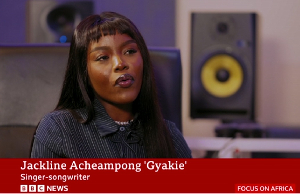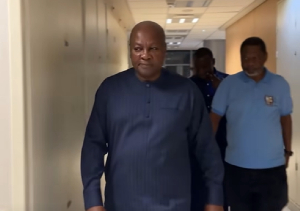By Dr Frankie Asare-Donkoh - fasado@hotmail.com
“I feel sad listening to Felix... If people are not ready to govern they should let us know.” This is what Mr Daniel Batidam said on August 28, 2013, after the announcement of the publication of the much-awaited GYEEDA report.
On that day then Deputy Minister of Information, Felix Kwakye Ofosu, in a 36-second media briefing announced the publication of the controversial Ghana Youth Employment and Entrepreneurial Development Agency (GYEEDA) report. “The report is out there”, he said.
On September 11, 2013, Mr Batidam in reference to the corruption case, which involved former Minister of Health under President J. A. Kufour’s government, Dr Richard Winfred Anane, said the narrow view of corruption affected the outcome of a High Court ruling that freed Anane in 2006.
Dr Anane was freed by the court from the corruption charges for which the Commission for Human Rights and Administrative Justice (CHRAJ) found him guilty of conflict of interest and abuse of office.
However, Batidam, then head of the African Parliamentarians Network Against Corruption, described the court’s decision as an ‘absurdity’ because in the view of the court the action of Anane ‘was not corruption because corruption had not been properly defined by the legal code’.
On December 10, 2014, Mr Batidam, who had become a Presidential Advisor on Corruption, called on Ghanaians “to demand accountability and transparency from leaders by going through due process” and also for the “criminalisation of corruption in order to serve as a deterrent to people”.
He also demanded the de-politicisation of corrupt acts in an effort to effectively and duly punish such offenders, because politicisation of corruption makes it very difficult for state institutions to deal with it.
“We should also not only talk about or discuss corruption but we must most importantly report people purported to be corrupt for the necessary action to be taken against them”, he said.
In a strange twist, on the same day, when there were public calls on the President to publish the names and offences of the 300 people he claimed were being prosecuted for corruption, Mr Batidam said, “asking for the names to be published is tantamount to asking for the names of all criminals in Ghana to be published.”
Again, On March 3, 2015, the man who is paid to advise the President to fight corruption was rather defending the government when the public raised concerns when the President’s directives that illegal monies paid to AGAMS, ZEERA, and JOSPONG groups of companies had gone unheeded.
He said, “there is a limit to which executive directives can go…there is only that much that the executive can do,” pointing out that the prosecution of Abuga Pele is a testament to the president’s commitment to the fight of corruption.
Mr Batidam, who last year urged Ghanaians “to demand accountability and transparency from leaders”, on Wednesday turned himself into a government public relations officer by attacking those who have questioned the government’s willingness in fighting corruption.
He was reported to have said arrogantly that everybody should mind their own business if they cannot do anything good for the government or the nation; and that people have no right to speak against the government or use bad words for the government or the authorities concerned with the government.
This was when Prof Kwesi Yankah, President of Central University College had questioned Batidam’s anti-corruption principles following his seemingly lack of action compared to when he was not in government.
In defending himself that his principles on fighting corruption had not changed, Batidam exploded: “…There are people in civil society, NGOs and in academia who are more corrupt than people in government. You can only be corrupt as the opportunity avails…if I start calling names of people in NGOs and accuse them of corruption, you may be shocked, but I can shorten that shock by providing you with evidence.”
This is very shocking when one considers that a person claiming to be anti-corruption crusader would know of high level of corruption in NGOs and academia and still keep quite over it.
His excuse that he had never made this startling revelation because it would take the needed attention from the real issues affecting the nation and only end up in a blame game, is very lame and unacceptable.
Batidam has consistently displayed inconsistencies in his so-called fight against corruption. His anger at Prof Yankah for stating the obvious is very misdirected because, in my view, he had compromised his position as a member of government and is now speaking like one of the government communication team members.
For instance, how does Batidam want Ghanaians to believe in the President and his government’s fight against corruption, when former Minister of Youth and Sports, Elvis Afriyie Ankrah, was accused of corruption, but was just moved from the ministry to the Presidency?
When Richard Anane was accused of corruption, President Kufuor interdicted him. President Kufuor however, erred by keeping the post unfilled until Anane was freed and gave him back his position. This rendered the whole interdiction as cosmetic, yet at least, it is on record that Anane was not allowed to parade himself as minister at the Presidency when his trial was going on.
President Mahama should have shown Ghanaians that he was serious in fighting corruption by interdicting Afriyie Ankrah, for him to purge himself of any corruption allegation before re-appointing him. By merely moving him from the Youth Ministry to the Presidency, still as a minister, amounted to condoning corruption.
Batidam needs to clear himself of his consistent inconsistencies and proof to the world that he still wants to fight corruption even in government.
And what is Mr Osei Kyei Mensah-Bonsu saying, that he must be declared unopposed in the primaries in his constituency, merely because he is the Minority Leader in Parliament?
The New Patriotic Party (NPP) Member of Parliament for Suame is reported to have said that the NPP must put in place a policy to prevent any party member from challenging him in the party’s primaries because he is the party’s leader in Parliament, adding that the practice where the party allows its leader in Parliament to be challenged is undemocratic.
Was Mensah Bonsu not in Parliament when Abraham Osei Aiddo, former Majority Leader was contested in his Tema West constituency and defeated in the primaries by Irene Naa Torshie Addo?
Hon Mensah Bonsu is a very respected MP, but it’s very strange for somebody like him to say that it is “undemocratic” for him to be challenged. What does he understand ‘democracy’ to mean – a life-long unchallenged parliamentary career?
One would have thought that his long years in Parliament would have guided him to deal with his constituents in a way that would make them readily renew his mandate based on his achievements in the constituency.
Osei Kyei Mensah Bonsu should stop shedding tears and prepare himself to fight for his seat instead of asking his party to ring-fence his position, since he was not born a majority or minority leader in parliament, and he is not the first to occupy that position? Democracy allows the electorate to elect their own representatives and not what he is calling for – imposition.
Opinions of Tuesday, 5 May 2015
Columnist: Asare-Donkoh, Frankie
Batidam’s consistent inconsistencies…And Kyei-Mensah Bonsu’s tears
Entertainment













